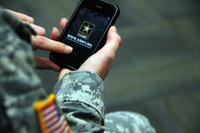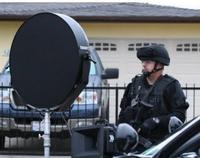-
DHS formula grants to states drop dramatically
DHS money allocation o money to states for first response and disaster recovery has dropped significantly. DHS formula grant program was at an all-time high of $2 billion in 2003, but last year the program had only $294 million. As a result of the sequester, another 5 percent will be cut from the program.
-
-
U.S. Army weak on mobile devices security

The U.S. Army has developed a mobile strategy to guide its adoption of mobile devices. A Department of Defense audit found that the Army has been lax in developing security guidelines for the use of the thousands of mobile devices now in service, and that these already-weak and insufficient security guidelines are inconsistently implemented.
-
-
Larger fire-fighting crews save lives, limit damage in high-rise fires
Between 2005 and 2009 there were, on average, 15,700 high-rise structure fires annually in the United States. Average annual losses totaled 53 civilian deaths, 546 civilian injuries, and $235 million in property damage. When responding to fires in high-rise buildings, firefighting crews of five or six members — instead of three or four — are significantly faster in putting out fires and completing search-and-rescue operations, concludes a major new study.
-
-
Bombs kill 2, injure 23 at Boston Marathon
Two loud explosions near the finish-line of the Boston Marathon killed two people and injured twenty-three this afternoon. The two blasts occurred after about half the runners taking part in the marathon had already crossed the finish line. Thousands of runners were still heading toward the finish line, but race organizers halted the race within minutes after the explosions.
-
-
Large DHS ammunition purchase continues to be a topic of debate

Conservative lawmakers and commentators continue to question why DHS is purchasing 1.6 billion rounds of ammunition, and will the agency do with so many bullets. DHS says it is cheaper to buy things in bulk, and that the rounds will be used in target practice and training for government agencies’ employees.
-
-
ATF: store which sold guns to Lanza’s mother committed more than 500 firearm violations

The Bureau of Alcohol, Tobacco, Firearms and Explosives (ATF) found that the gun store which sold the mother of Adam Lanza the guns he used to carry out the Sandy Hook Elementary massacre, had been cited for more than 500 violations of federal firearms laws and regulations. The store’s license has now been revoked.
-
-
Forensic scientists recover fingerprints from foods

Forensic scientists at the University of Abertay Dundee have recovered latent fingerprints from foods — publishing the U.K.’s first academic paper on this subject. Only two other studies have ever reported successfully recovering fingerprints from foods, but the research for these took place in India and Slovenia using chemical substances that are not routinely used in Britain.
-
-
Footwear safety reflectors help in detecting bioterror threats

Tiny versions of the reflectors on sneakers and bicycle fenders that help ensure the safety of runners and bikers at night are moving toward another role in detecting bioterrorism threats and diagnosing everyday infectious diseases, scientists said the other day.
-
-
Canada’s crime-rate calculation method significantly underestimates actual crime numbers
The government of Canada is using a method called “capping” to measure crime in Canada. Capping is a common methodological practice used in most victimization surveys. Researchers find, however, that the technique significantly underestimates the number of crimes — especially the violent kinds — that occur in Canada.
-
-
New Jersey to launch emergency, preparedness awareness campaign
The New Jersey Office of Homeland Security and Preparedness is currently looking for a PR firm to help it launch a multifaceted awareness campaign. The campaign, worth about $4 million over three years, would aim to increase the level of emergency awareness and preparedness of residents, businesses, and communities in New Jersey.
-
-
DHS, international tech-crime investigative body, partners on cybersecurity
The High Technology Crime Investigation Association (HTCIA) said it would team up with DHS Stop. Think. Connect. Campaign’s National Network. The partnership will promote awareness of cyber security to industry, university, and government organizations nationwide.
-
-
Sponsors of CISPA to address nagging privacy concerns about the bill
House Intelligence Committee chairman Mike Rogers (R-Michigan) and Ranking Member Dutch Ruppersberger (D-Maryland), sponsors of the Cyber Information Sharing and Protection Act (CISPA), say they are currently working on the draft to alleviate privacy concerns civil liberty advocates may have about the bill.
-
-
Napolitano’s arguments about border security undermined by rise in arrests

As recently as last Thursday, DHS secretary Janet Napolitano said that border security is at its most robust in years. New numbers released on the same day tell a different story about activity on the border: arrests on the border are up 13 percent compared to this time last year, from 170,223 last year to 192,298 this year. Napolitano argues that arrests alone are not a reflection of how secure the border is, and that crime statistics in border regions – a better measure of border security, she says — are down from previous years.
-
-
More border security means more business opportunities for tech companies

At last month’s Border Security Expo in Phoenix, both start-ups and established companies showed off their inventions in an effort to pitch projects to federal agencies. Two themes emerged in the show: the expo demonstrated that many of the systems and weapons systems that were used in the Iraq and Afghanistan wars are now becoming available to local, state, and federal law enforcement agencies – and companies expressed concern about the impact the federal budget cuts will have on their pockets.
-
-
Mississippi towns build tornado-proof domes

Following a devastating tornado two years ago, the town of Smithville, Mississippi, has started construction on a tornado-proof dome. The dome, to be built on the grounds of the local high school, will double as a gym and a storm shelter. Other towns in Mississippi have also begun their own dome projects.
-
More headlines
The long view
Tantalizing Method to Study Cyberdeterrence
Tantalus is unlike most war games because it is experimental instead of experiential — the immersive game differs by overlapping scientific rigor and quantitative assessment methods with the experimental sciences, and experimental war gaming provides insightful data for real-world cyberattacks.
Using Drone Swarms to Fight Forest Fires
Forest fires are becoming increasingly catastrophic across the world, accelerated by climate change. Researchers are using multiple swarms of drones to tackle natural disasters like forest fires.
Testing Cutting-Edge Counter-Drone Technology
Drones have many positive applications, bad actors can use them for nefarious purposes. Two recent field demonstrations brought government, academia, and industry together to evaluate innovative counter-unmanned aircraft systems.
European Arms Imports Nearly Double, U.S. and French Exports Rise, and Russian Exports Fall Sharply
States in Europe almost doubled their imports of major arms (+94 per cent) between 2014–18 and 2019–23. The United States increased its arms exports by 17 per cent between 2014–18 and 2019–23, while Russia’s arms exports halved. Russia was for the first time the third largest arms exporter, falling just behind France.
How Climate Change Will Affect Conflict and U.S. Military Operations
“People talk about climate change as a threat multiplier,” said Karen Sudkamp, an associate director of the Infrastructure, Immigration, and Security Operations Program within the RAND Homeland Security Research Division. “But at what point do we need to start talking about the threat multiplier actually becoming a significant threat all its own?”
The Tech Apocalypse Panic is Driven by AI Boosters, Military Tacticians, and Movies
From popular films like a War Games or The Terminator to a U.S. State Department-commissioned report on the security risk of weaponized AI, there has been a tremendous amount of hand wringing and nervousness about how so-called artificial intelligence might end up destroying the world. There is one easy way to avoid a lot of this and prevent a self-inflicted doomsday: don’t give computers the capability to launch devastating weapons.
